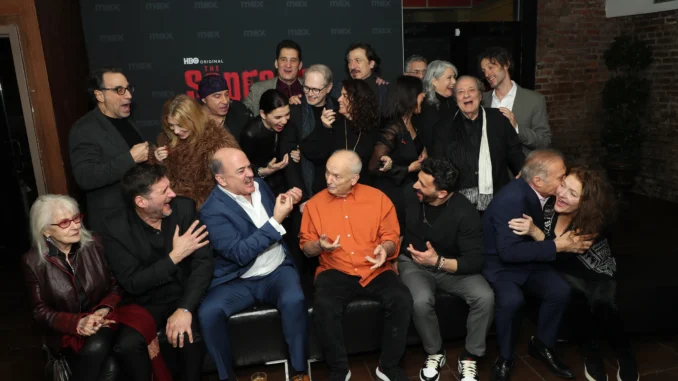
In the late ’90s, HBO took a bold leap into the unknown with The Sopranos, a show that not only redefined television but also left an indelible mark on pop culture. Now, with Alex Gibney’s documentary Wise Guy: David Chase and The Sopranos, we get a fresh perspective on the making of this iconic series. Let’s explore the profound connection between Chase and his infamous creation, Tony Soprano, and how this show became a cornerstone of modern storytelling.
The Birth of a Phenomenon
HBO’s Risky Gamble
Back in 1999, HBO was still finding its feet in original programming. When The Sopranos premiered, it wasn’t just another crime drama; it was a high-stakes gamble. Executives and viewers alike were unsure whether a show centered around a Mafia family would resonate. But David Chase had a vision that transcended the typical mobster narrative. He wanted to explore the complexities of identity, morality, and family—unpacking the mind of a hitman who was also a family man.
David Chase: The Man Behind the Mob
David Chase is a fascinating figure. Born and raised in New Jersey, he infused his own life experiences into Tony Soprano’s character. In Gibney’s documentary, Chase opens up about his childhood, particularly his complicated relationship with his mother, which profoundly influenced his writing. The similarities between Chase and Tony are striking; both grapple with deep-seated neuroses and search for meaning in chaotic worlds.
In Wise Guy, you can see how Chase’s introspective nature parallels Tony’s therapy sessions with Dr. Melfi. Chase’s candidness about his insecurities and fears makes him a relatable figure—an everyman navigating his demons, much like his famous alter ego.
Exploring Themes Through Therapy
The Therapy Room as a Narrative Device
One of the most ingenious aspects of The Sopranos is its use of therapy as a narrative device. In the documentary, Gibney cleverly recreates the therapy room where Tony unraveled his psyche. This setting symbolizes not just Tony’s struggles but also Chase’s exploration of his own vulnerabilities.
As we watch Chase delve into his past, it’s clear that The Sopranos is more than just a Mafia story; it’s a profound exploration of the human condition. Chase reveals how Tony’s battles with anxiety, depression, and family dynamics reflect his own life. It’s a raw and honest look at how art imitates life, with Chase using the series to process his experiences and emotions.
Lessons from Therapy
Chase’s reflections on his interactions with the cast and crew add another layer to the story. He acknowledges his sometimes abrasive nature and how it may have stifled creativity in the writers’ room. “Maybe if I hadn’t answered every suggestion with ‘No,’” he muses, illustrating how his own defensive traits shaped the show.
This self-awareness is not just refreshing; it also highlights the collaborative effort behind The Sopranos. While Chase is often seen as the genius behind the series, the contributions of actors like Edie Falco and Lorraine Bracco are invaluable. Their portrayals of Carmela and Dr. Melfi, respectively, added depth to the narrative and made the characters unforgettable.
The Cultural Impact of The Sopranos
A Show Ahead of Its Time
From its portrayal of mental health to its nuanced characters, The Sopranos tackled issues that were often glossed over in mainstream media. The show didn’t shy away from exploring the darker sides of human nature, pushing boundaries and challenging viewers’ perceptions.
Gibney’s documentary takes us on a journey through the cultural zeitgeist that The Sopranos influenced. Its impact on television is undeniable; it paved the way for future shows that would similarly blend drama with complex character studies. Think about it: without Tony Soprano, would we have Walter White or Don Draper? Probably not.
The Legacy of Tony Soprano
Tony Soprano became a cultural icon—a character who embodied the struggles of modern man. He’s flawed, vulnerable, and deeply relatable, which is a testament to Chase’s writing. The documentary illustrates how Tony’s journey resonates with audiences on multiple levels, making us question what it means to be human in a chaotic world.
Chase’s storytelling invited viewers to empathize with a character who, on the surface, seemed irredeemable. It challenged us to explore our own moral boundaries and consider the complexities of right and wrong. This depth is what makes The Sopranos enduring; it’s a show that keeps on giving, even decades after it first aired.
Behind the Scenes: Fun Facts and Anecdotes
Audition Tapes and Bloopers
Gibney’s documentary doesn’t just stick to heavy themes; it also injects moments of humor and nostalgia with audition tapes and behind-the-scenes bloopers. These lighthearted snippets remind us that creating a show of such magnitude also involved a lot of fun and camaraderie. The cast’s chemistry, both on-screen and off, played a significant role in bringing Chase’s vision to life.
The Misunderstood Genius
Chase himself emerges as a complex figure throughout the documentary. While he’s celebrated for his genius, he also grapples with feelings of imposter syndrome. It’s fascinating to see someone so revered still questioning their worth and contributions. This vulnerability adds another layer to our understanding of both Chase and the show.
Conclusion: A Lasting Legacy
In Wise Guy: David Chase and The Sopranos, Alex Gibney not only chronicles the making of a groundbreaking show but also offers an intimate portrait of the man behind it. The documentary serves as a reminder that The Sopranos is more than just a television series; it’s a profound exploration of identity, morality, and the human condition.
Chase’s relationship with Tony Soprano is a mirror reflecting his own struggles and triumphs, making the show feel personal and relatable. Whether you’re a die-hard fan or a casual viewer, this documentary is a compelling exploration of one of the best shows ever made.
